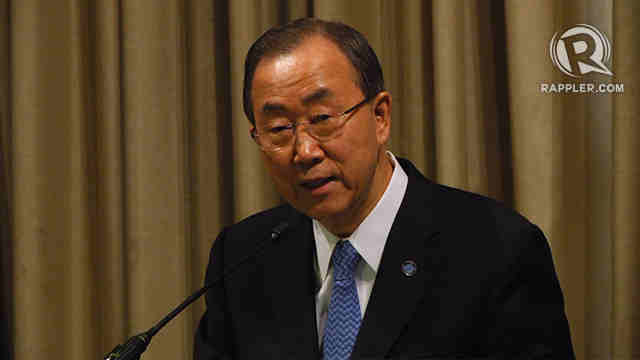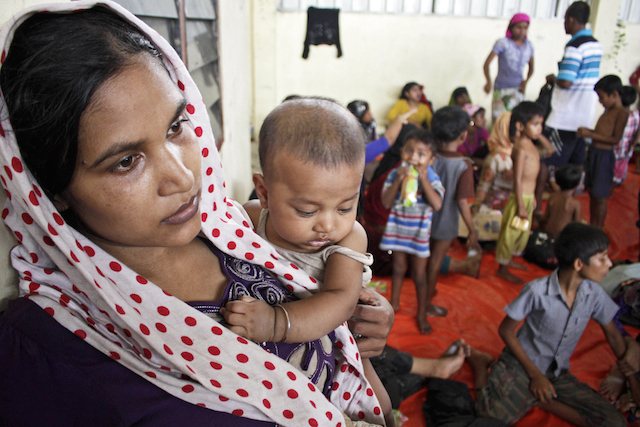RAPPLER
 Foreign Minister Julie Bishop says Indonesia estimated that only 30% to 40% of the thousands still stranded at sea were Rohingya
Foreign Minister Julie Bishop says Indonesia estimated that only 30% to 40% of the thousands still stranded at sea were Rohingya
'RESCUED.' In this handout photo released May 22, the Myanmar navy rescue a boat loaded with 219 migrants, most of them from Bangladesh according to a government website. Malaysia and Indonesia say they would start helping thousands of Rohingya migrants on boats off their shores. Handout photo from Myanmar Information Ministry/EPA
SYDNEY, Australia – Indonesia has told Australia that most of the migrants stranded at sea in Southeast Asia are illegal laborers from Bangladesh, not oppressed Muslim Rohingya, Foreign Minister Julie Bishop said in comments published Saturday, May 23.
More than 3,500 migrants have swum to shore or been rescued off the coasts ofMalaysia, Indonesia, Thailand and Bangladesh since a Thai crackdown on human-trafficking in early May threw the illicit trade into chaos.
Speaking to The Weekend Australian newspaper, Bishop said Indonesia estimated that only 30% to 40% of the thousands still stranded at sea were Rohingya – an impoverished Muslim community from Myanmar's western Rakhine state.
"They (Indonesia) believe there are about 7,000 people at sea [and] they think about 30 to 40% are Rohingya, the rest are Bangladeshi; and they are not, in Indonesia's words, asylum-seekers, they are not refugees – they are illegal laborers. They've been promised or are seeking jobs in Malaysia," Bishop said.
"They said the Rohingya have gone to Bangladesh and have mixed up with the Bangladeshis who are coming to Malaysia in particular for jobs."
Bishop said that Indonesia's director-general of multilateral affairs, Hasan Kleib, had told her that on one vessel, Bangladeshis accounted for 400 of the 600 people onboard.
Myanmar has faced increasing international pressure to stem the exodus from its shores and deliver urgent humanitarian relief to thousands still trapped at sea.
On Friday, May 22 it said its navy had rescued a boat in the Bay of Bengal and brought to shore 208 people. (READ: Rohingya, Bangladeshi migrants describe carnage over food)
Tin Maung Swe, a senior official in the western state of Rakhine, told Agence France-Presse (AFP) that "about 200 Bengalis" were onboard.
"Bengalis" is a term often used pejoratively by Myanmar officials to describe the Muslim Rohingya minority, 1.3 million of whom live in the country but are not recognized as citizens. (READ: Rescued Rohingya in Aceh: 'We do not have a home')
Australia, which maintains a hardline policy of denying asylum-seekers who arrive by boats resettlement and which turns back vessels when it can, has maintained its refusal to resettle any stranded boat people, saying to do so would encourage people-smuggling.
"I will say or do nothing to encourage people to take to the sea in boats and any suggestion that there is some kind of special resettlement program here in Australia for people taking to the sea in boats just encourages people-smuggling," Prime Minister Tony Abbott said on Friday.
"So it would be utterly irresponsible of me or anyone to suggest for a second that we will reward people for doing something so dangerous." – Rappler.com
Read more:
Saving migrant lives at sea 'top priority' – UN chief
'But when people are drifting on the sea, how we can search and rescue them and provide life saving humanitarian assistance, that is a top priority at this time,' says UN chief Ban Ki-moon
Agence France-Presse
Published 3:09 PM, May 23, 2015

TOP PRIORITY. UN Secretary General Ban Ki-moon hopes regional nations will tackle the 'root causes' of the current exodus of migrants stranded at sea. File photo by Franz Lopez/Rappler
HANOI, Vietnam — United Nations chief Ban Ki-moon said on Saturday, May 23, that saving the lives of migrants stranded at sea in Southeast Asia should be a "top priority" as the region battles with an exodus of boat people fleeing persecution and poverty.
The UN Secretary General said he hoped regional nations would tackle the "root causes" of the current exodus at an upcoming conference in Thailand later this month.
"But when people are drifting on the sea, how we can search and rescue them and provide life saving humanitarian assistance, that is a top priority at this time," he told reporters during a visit to Hanoi.
Ban said he had been in recent discussions with regional leaders in Thailand, Malaysia and Myanmar and urged a "very clear addressing of the root causes of this issue, why people are fleeing.”
Ban's comments come as Myanmar faces growing international pressure to address its treatment of the country's 1.3 million Rohingya minority Muslims. (FAST FACTS: Who are the Rohingya people?)
The widespread persecution of the impoverished community in western Rakhine state is one of the primary causes for the current regional exodus, alongside growing numbers trying to escape poverty in neighbouring Bangladesh.
Most migrants aim for Malaysia and Indonesia through dangerous and lucrative smuggling networks that criss-cross the region.
Ban also called on countries who receive migrants "not to send them back to a dangerous circumstance or situation.”
Thailand has organised a regional conference in Bangkok on 29 May to address the crisis. — Rappler.com
Myanmar to deport migrants as UN chief urges further rescues
'We are giving humanitarian assistance to them. After that we will deport them back to the relative country,' says Zaw Htay, director of Myanmar's Presidential Office
Hla-Hla Htay, Agence France-Presse
Published 5:49 PM, May 23, 2015

ROHINGYA. Myanmar faces increasing international pressure to stem the deluge from its shores and deliver urgent humanitarian relief to thousands still trapped at sea. File photo by Jun Ha/EPA
YANGON, Myanmar — A group of migrants recently rescued by Myanmar will be deported to Bangladesh, officials confirmed on Saturday, May 23 as the United Nations chief called on regional nations to prioritize saving the lives of those still stranded at sea.
Southeast Asia is currently battling an exodus of boat people fleeing persecution and poverty, with up to 2,000 vulnerable migrants thought to be stranded in the Bay of Bengal, many at the mercy of ruthless people smugglers.
Most are Muslim Rohingyas from the western Rakhine state in Myanmar, where they are not recognized as citizens and instead referred to as "Bengalis" or illegal immigrants from Bangladesh. (FAST FACTS: Who are the Rohingya people?)
Bangladeshis, meanwhile, are also trying to escape grinding poverty.
More than 3,500 migrants have swum to shore or been rescued off the coasts of Malaysia, Indonesia, Thailand and Bangladesh since a Thai crackdown in early May on human-trafficking threw the illicit trade into chaos.
Myanmar has faced increasing international pressure to stem the deluge from its shores and deliver urgent humanitarian relief to thousands still trapped at sea.
On Friday, the country's navy said it had carried out its first rescue of a migrant boat when scores of bare-chested men were found crammed into the hull of a wooden fishing vessel and taken to shore.
Myanmar officials say all 208 men are from Bangladesh and will soon be returned there. Agence France-Presse wasn't able to independently verify where the migrants were from.
"We are giving humanitarian assistance to them. After that we will deport them back to the relative country," Zaw Htay, director of the Presidential Office, told Agence France-Presse on Saturday.
"We have made contact with Bangladeshi border officials on the ground regarding the arrived persons," he added.
'Save lives'
The rescue by the Myanmar navy comes as fears grow for migrants still stuck at sea at a time when the dry winter months are about to give way to the regional monsoon.
UN Secretary General Ban Ki-moon said finding and saving the lives of those migrants should be a "top priority.”
Speaking during a visit to Hanoi, he called on regional nations to tackle the "root causes" of the current exodus at an upcoming conference in Thailand later this month.
"But when people are drifting on the sea, how we can search and rescue them and provide life saving humanitarian assistance, that is a top priority at this time," he said.
At home Myanmar's Rohingya face daily discrimination and a raft of restrictions. Many live in displacement camps after scores of Rohingya were killed in 2012 during communal bloodshed with local Buddhists — an event that caused a spike in people to flee on boats.
Most migrants aim for Malaysia and Indonesia using dangerous and lucrative smuggling networks that criss-cross the region.
Over recent years, hundreds of thousands of Rohingya and Bangladeshis have left their homes in what has become the largest regional sea migration since the end of the Vietnam War.
The smugglers largely went about their business unhindered until the crack down by Thailand on smuggling networks in the country's south, which caused many gang masters to abandon their victims.
Other smugglers off the coast of Myanmar have held off making the crossing because of the crackdown.
A trickle of would-be migrants have managed to return to Myanmar after relatives raised funds to buy them back from smugglers.
But many more are thought to be still stuck on boats.
Aid workers have urged countries to rescue them before the region is lashed by heavy monsoon rains. — Rappler.com
No comments:
Post a Comment